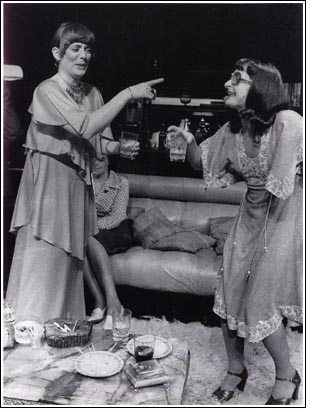|
 Abigail's
Party is a
house of mirrors in which reflected images have completely replaced
the originals–Beverly, for example, being less a hostess than something
much more unsettling: someone playing at being a hostess.
In a sense, there is no Beverly. When we look for her we find only
an actress playing a part, a ventriloquist's dummy mouthing someone
else's words, an impersonation of a person. She has given up her
identity, such as it is, to play a role, which she acts out
not only in public but, more disturbingly, even in private. That
is the importance of the opening minute or so in which she is alone
on camera. We watch her "acting" even when no one else
is present. She is not performing for an audience–her husband or
her guests, but doing something much spookier: For herself. She
is validating herself to herself. Abigail's
Party is a
house of mirrors in which reflected images have completely replaced
the originals–Beverly, for example, being less a hostess than something
much more unsettling: someone playing at being a hostess.
In a sense, there is no Beverly. When we look for her we find only
an actress playing a part, a ventriloquist's dummy mouthing someone
else's words, an impersonation of a person. She has given up her
identity, such as it is, to play a role, which she acts out
not only in public but, more disturbingly, even in private. That
is the importance of the opening minute or so in which she is alone
on camera. We watch her "acting" even when no one else
is present. She is not performing for an audience–her husband or
her guests, but doing something much spookier: For herself. She
is validating herself to herself.
In this night of the
living dead, there is no Beverly separable from the part she plays.
Her identity is completely synthetic–a shaky structure of
prefab "attitudes," poses, self-regarding routines, and
shop-worn hostess-with-the-mostest affectations. Like some brilliant,
performing circus animal, Beverly provides a dazzling "display"
of canned phrases, gestures, and tones that simulate states of thinking,
feeling, and caring without ever getting within three martinis of
the reality.
We can recognize the
theatricality of Beverly's performance not only through Alison Steadman's tonal archness in her line delivery, which inserts brackets
around each of Beverly's gestures and quotation marks around each
of her utterances, but even in the script. There is something artificial,
imitated, derivative, or inauthentic about virtually every line
of dialogue Beverly utters. It all feels "scripted"–and
it is, not by Leigh, of course, but by Beverly.
Beverly inhabits a realm–call
it hostess-speak–in which verbal expressions bear no relationship
to real feelings (or an inverse relationship, as in the case of
the syrupy "please" she intermittently coos in Laurence's
direction, which is not in the least a polite request but a snarled
imperative and threat). Like the Hollywood air kissing Beverly's
speech resembles, social interaction in this world becomes a kind
of bad acting in which you "indicate" your emotions instead
of actually feeling them. (Real, messy emotion would only get in
the way, impeding the smoothness of the performance and embarrassing
the audience.) Since each of the participants in the drama knows
it is all theater, the fraudulence, the archness, is not concealed
but cultivated and proclaimed, as a way of expanding their identities
and intensifying their presence.
As that way of putting
it is meant to suggest, the problem Leigh is examining is much deeper
than what is normally connoted by insincerity. Beverly (like all
of the other characters in Abigail's Party) is not covering
up her real feelings and thoughts. That would be an entirely more
conventional dramatic situation. It would suggest that she knows
what she is doing. It would imply that she was simply trying to
fool people (a fairly simple situation in life and art), when the
real problem is that she is fooling herself (a much more interesting
state of affairs). Beverly is completely and utterly sincere; she
means what she says; she is not being deceitful. Which is the true
problem. There is no reality lurking in the depths; everything
is fake. Beverly's ideas and emotions are no different from
her jewelry: both are equally cheap knock-offs. Her most private,
inner experiences are as performance not only through Alison Steadman's tonal archness in her line delivery,èd as her expressions.
Most films, particularly
American ones, cultivate what might be called a "surface-depth"
understanding of the relation of falsity and truth. Surfaces, appearances,
expressions are potentially delusive or misleading; truth lies in
the depths. It is hidden somewhere underneath visible expressions.
If you cross-examined Laurence and Beverly in private, and dug for
the truth, you could get them to confess to their lies. This simply
is not the situation Leigh imagines. He holds us on the surface
and, in fact, tells us that the surfaces are all there are. There
is no realm of "truth" underneath or distinguishable from
the realm of "falsehood." There are no secrets to exhume.
There are no psychological depths to mine–or at least none that
matter–in Abigail's Party . No one is being deceitful. No
one is covering up anything. That would simplify understanding.
We could dive down and discover the truth as we do in films like
Citizen Kane or Casablanca. The situation Leigh imagines–here
and in all of his work–is far more complex. There is no escape
from slippery, shifting, multivalent surfaces. There is no realm
of unsullied, uninflected reality underneath. Everything is mixed.
We must live in the flux....
–Excerpted from Ray
Carney, The Films of Mike Leigh: Embracing the World (London
and New York: Cambridge University Press, 2000).
 |
 
|
|
Ray
Carney's The Films of Mike Leigh is quite simply the
best book of film criticism I have ever read.
Now I have to say
that I have never read any of Carney's other books (he has
also written books on Cassavetes, Frank Capra, and Carl Dreyer),
which, for all I know, might be even better. But as a friend
of mine put it, 'His writing blows everything else out there
away, even to the point of many times seeming like simply
in a class of his own...different in kind more than degree.'
And although I admit to not having read 'everything else out
there,' I feel the exact same way. Ray Carney's new book has
undeniably rocked my world.
Ray Carney's book
is to what usually passes for film criticism what Mike Leigh's
movies are to what, in Hollywood, usually passes for filmmaking:
a truly radical critique, a whole different animal, and a
solitary voice of sanity that has somehow miraculously managed
to make itself heard over the noise and hullabaloo of this
culture's present-day insanity.
|
|
–Caveh
Zahedi, creator of A Little Stiff and I Don't Hate
Las
Vegas Anymore,
in a review in Filmmaker Magazine
|
| To learn
how to obtain this book, click
here |
|










